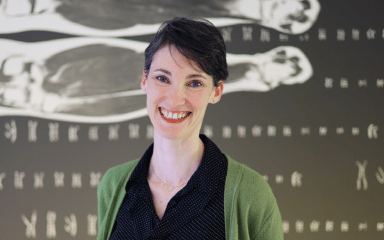Team Leader, Disease Models and Therapies
Dr Rhonda Taylor

Team Leader, Disease Models and Therapies
Dr Rhonda Taylor
Profile
Dr. Rhonda Taylor completed her PhD in 2015 under the supervision of Dr Daniela Ulgiati. The focus of her doctoral studies was the identification and characterisation transcriptional regulatory mechanisms, and the role of non-coding single nucleotide polymorphisms in human health and autoimmune disease.
Rhonda is now applying her interest in regulation of gene expression to the field of early onset neuromuscular disorders. Specifically, her research has two main aims; 1) To improve rates of genetic diagnosis by developing a pipeline for the routine screening of regulatory regions (in collaboration with Prof. Alistair Forrest), and 2) to develop new treatments for early onset neuromuscular disorders.
Rhonda is the Perkins Team Leader of the Disease Models and Therapies Team in the Group. Rhonda is the first Perkins researcher to be awarded Perkins Team Leader status.
Rhonda has experience teaching and lecturing in the field of genetics as part of the UWA School of Biomedical Sciences. She is a member of both the Harry Perkins Institute EMCR and Student committees. She was previously chair of the WA CRISPR-iPSC users group. She is a UWA ALLY.
Dr Rhonda Taylor is a Research Associate in the Rare Disease Genetics and Functional Genomics (formerly called Neurogenetic Diseases) Laboratory at the Perkins.
Research Interests
- Identification of disease-causing mutations in regulatory regions
- AAV-mediated gene therapy
- Upregulation of foetal gene isoforms as a therapy for muscle disease
- CRISPR-Cas9 mediated gene editing and manipulation of gene expression
- Oligonucleotides-based treatments for muscle disease
- induced pluripotent stem cell models of muscle disease
Selected publications
- Taylor RL, Karimi M, Westcott L, Abraham LJ, Tsao BP, Boackle S, et al. Focussed transcription from the CR2/CD21 core promoter is regulated by synergistic activity of TATA and Initiator elements in mature B cells, Cell Mol. Immunol. 2016; 13(1):119-31.
- Zhao J*, Giles BM*, Taylor RL*, Yette GA, Lough KM, et al. Preferential Association of a Functional Variant in Complement Receptor 2 with Antibodies to Double-Stranded DNA, Rheum. Dis. 2016; 75(1):242-52.
- Taylor, R. L., M. N. Cruickshank, M. Karimi, H. L. Ng, E. Quail, K. M. Kaufman, J. B. Harley, L. J. Abraham, B. P. Tsao, S. A. Boackle, and D. Ulgiati. 2016. ‘Focused transcription from the human CR2/CD21 core promoter is regulated by synergistic activity of TATA and Initiator elements in mature B cells’, Cell Mol Immunol, 13: 119-31.
- Boutilier JK*, Taylor RL*, Mann T, McNamara E, Hoffman GJ, Kenny J, et al. Gene expression networks in the murine pulmonary myocardium provide insight into the pathobiology of atrial fibrillation, G3: Genes, genomes, genetics, 2017; 7(9): 2999-3017.
- Boutilier JK*, Taylor RL*, Ram R, Nguyen Q, McNamara E, Goullee H, et al. Variable cardiac α-actin (Actc1) expression in early adult skeletal muscle correlates with promoter methylation, BBA gene regulatory mechanisms, 2017; 1860(10): 1025-1036.
- Nilipour Y, Nafissi S, Tjust AE, Ravenscroft G, Hossein-Nejad H, Taylor RL, et al. Ryanodine receptor type 3 (RYR3) as a novel gene associated with a myopathy with nemaline bodies, European Journal of Neurology, 2018; 25(6): 841-847.
- Taylor RL, Davis M, Turner E, Brull A, Pinos T, Cabrera M, and Nowak KJ. Clinical utility gene card for: McArdle disease, European Journal of Human Genetics, 2018; 26:758-764.
- McNamara EL*, Taylor RL*, Clayton JS, Goullee H, Dilworth KL, Pinós T, et al. Systemic AAV8-mediated delivery of a functional copy of muscle glycogen phosphorylase (Pygm) ameliorates disease in a murine model of McArdle disease, Human Molecular Genetics, 2019;29(1):20–30.
- Ng, H. L., R. L. Taylor, J. Cheng, L. J. Abraham, E. Quail, M. N. Cruickshank, and D. Ulgiati. 2020. ‘Notch signaling induces a transcriptionally permissive state at the Complement C3d Receptor 2 (CR2) promoter in a pre-B cell model’, Mol Immunol, 128: 150-64.
- Goullee, H., R. L. Taylor, A. R. R. Forrest, N. G. Laing, G. Ravenscroft, and J. S. Clayton. 2021. ‘Improved CRISPR/Cas9 gene editing in primary human myoblasts using low confluency cultures on Matrigel’, Skeletal muscle, 11: 23.
- Clayton, J. S., C. K. Scriba, N. B. Romero, E. Malfatti, S. Saker, T. Larmonier, K. J. Nowak, G. Ravenscroft, N. G. Laing, and R. L. Taylor. 2021. ‘Generation of two isogenic induced pluripotent stem cell lines from a 4-month-old severe nemaline myopathy patient with a heterozygous dominant c.553C > A (p.Arg183Ser) variant in the ACTA1 gene’, Stem Cell Res, 53: 102273.
- Clayton, J. S., C. K. Scriba, N. B. Romero, E. Malfatti, S. Saker, T. Larmonier, K. J. Nowak, G. Ravenscroft, N. G. Laing, and R. L. Taylor. 2021. ‘Generation of two isogenic induced pluripotent stem cell lines from a 10-year-old typical nemaline myopathy patient with a heterozygous dominant c.541G>A (p.Asp179Asn) pathogenic variant in the ACTA1 gene’, Stem Cell Res, 55: 102482.
- Cabrera-Serrano, M., L. Caccavelli, M. Savarese, A. Vihola, M. Jokela, M. Johari, T. Capiod, M. Madrange, E. Bugiardini, S. Brady, R. Quinlivan, A. Merve, R. Scalco, D. Hilton-Jones, H. Houlden, H. Ibrahim Aydin, S. Ceylaner, J. Vockley, R. L. Taylor, C. Folland, A. Kelly, H. Goullee, E. Ylikallio, M. Auranen, H. Tyynismaa, B. Udd, A. R. R. Forrest, M. R. Davis, D. Bratkovic, N. Manton, T. Robertson, P. McCombe, N. G. Laing, L. Phillips, P. de Lonlay, and G. Ravenscroft. 2021. ‘Bi-allelic loss-of-function OBSCN variants predispose individuals to severe recurrent rhabdomyolysis’, Brain (in press).
*These authors contributed equally to this work.
